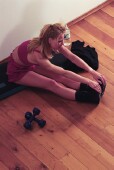
MONDAY, Feb. 16, 2015 (HealthDay News) — Even a few bouts of moderate exercise each week can cut a middle-aged woman’s odds for heart disease, blood clots and stroke, a new study finds.
The British study also found that exercising more frequently didn’t lead to greater reductions in heart risk.
The take-home message, according to study lead author Miranda Armstrong: “To prevent heart disease, stroke and blood clots, women don’t have to be super athletes or strenuously exercise daily to experience the benefits of physical activity.”
In fact, adding lots of extra strenuous exercise may offer “little additional benefit above that from moderately frequent activity,” Armstrong said in a news release from the American Heart Association. She is a physical activity epidemiologist at Oxford University in England.
The findings are published Feb. 16 in the journal Circulation.
In the study, Armstrong’s team tracked the health of more than 1.1 million British women who had no history of heart disease, stroke, blood clots, diabetes or cancer. The women averaged 56 years of age when they joined the study between 1996 and 2001.
Over an average follow-up of nine years, women who did moderate exercise two to three times a week had a 20 percent lower risk of heart disease, stroke or blood clots than those who did little or no exercise.
Moderate exercise was defined as being active enough to cause sweating or increased heart rate, and included walking, gardening and cycling.
Based on the findings, its clear that “inactive middle-aged women should try to do some activity regularly,” Armstrong said.
Two experts in the United States weren’t surprised by the findings.
“What we need to impress upon all women that their commitment to move does not have to be that of an athlete or be something that is overwhelming in her life,” said Dr. Suzanne Steinbaum, director of women and heart disease at Lenox Hill Hospital in New York City.
“All she needs to do is make the time 2 to 3 days a week to help protect her heart,” she said.
Dana Angelo White is assistant clinical professor of athletic training and sports medicine at Quinnipiac University in Hamden, Conn. She hopes the study “will be good motivation for middle-aged women who are currently inactive to do something. Physical activity does not need to be complicated, time-consuming or involve expensive equipment.”
More information
The U.S. Office on Women’s Health has more about physical activity.
Copyright © 2026 HealthDay. All rights reserved.

